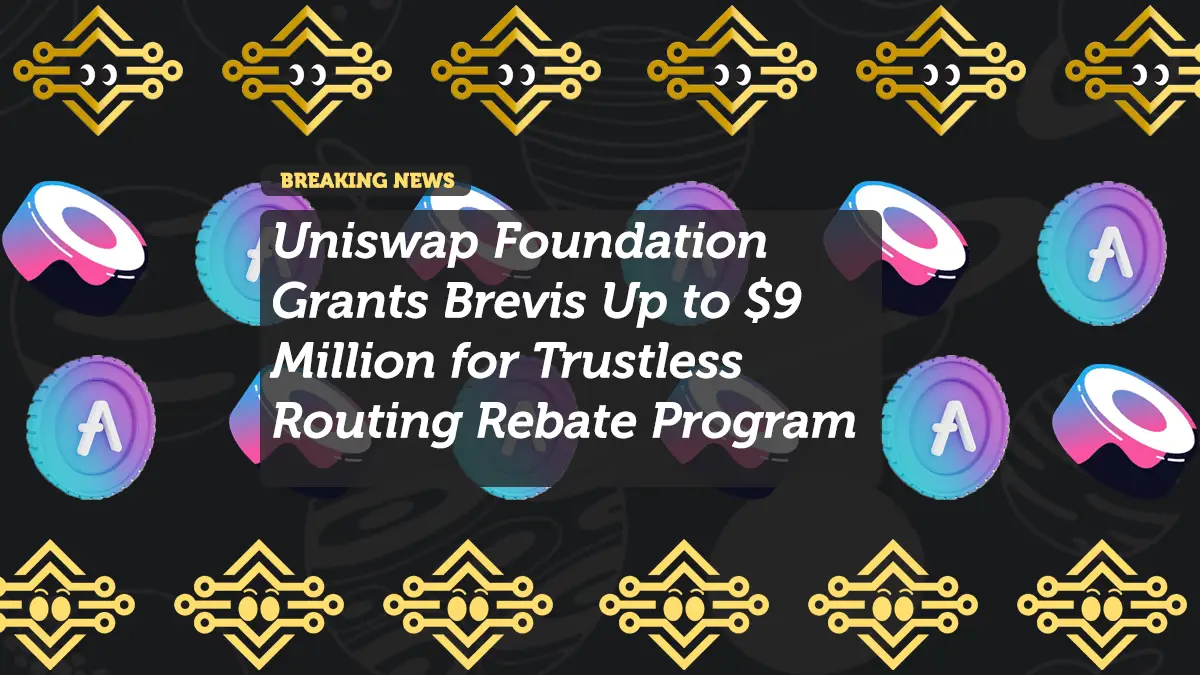
Uniswap Foundation Grants Brevis Up to $9 Million for Trustless Routing Rebate Program
The Uniswap Foundation has announced a grant of up to $9 million to Brevis, a blockchain infrastructure company, to develop a trustless routing rebate program designed to improve efficiency and transparency across the Uniswap protocol.
This initiative marks one of the largest ecosystem grants in Uniswap’s history and signals a strong push toward enhancing the DEX’s on-chain performance and user incentives.
What Is the Trustless Routing Rebate Program?
The routing rebate program aims to reward users and protocols that help execute trades more efficiently across the Uniswap network. Brevis will leverage zero-knowledge (ZK) technology to ensure that rebates are distributed in a fully trustless, transparent, and verifiable manner.
In essence, this mechanism will provide a self-sustaining reward model where traders, routers, and liquidity providers can benefit from enhanced execution without compromising decentralization.
Uniswap Foundation’s Vision for DeFi Efficiency
The Uniswap Foundation said in its statement that this grant reflects its long-term goal of building infrastructure that scales DeFi incentives responsibly. By enabling trustless routing rebates, Uniswap seeks to create a more efficient liquidity ecosystem that doesn’t rely on centralized intermediaries or opaque incentive schemes.
“The future of DeFi depends on secure, transparent incentive systems,” a Foundation spokesperson said. “Brevis is building the cryptographic backbone to make that possible.”
Brevis: A Key Player in Trustless Computation
Brevis, known for its work in ZK proofs and verifiable computation, plans to integrate this new program directly with Uniswap’s smart contracts. The company has already contributed to several open-source projects within the Ethereum ecosystem and has a track record of implementing privacy-preserving and trust-minimized architectures.
According to project details, Brevis will roll out the rebate program in phases over the next 18 months, with milestones tied to technical progress and audit completion.
Why This Matters for Uniswap and DeFi
This grant could reshape how Decentralized Exchanges (DEXs) handle liquidity incentives and execution efficiency. By using cryptographic verification instead of trust in intermediaries, Uniswap continues to push the DeFi sector toward a fully autonomous financial system.
If successful, this program might serve as a blueprint for other DeFi platforms, particularly in areas like order routing, gas optimization, and yield distribution.
Community and Developer Reactions
The crypto community has responded positively, with developers noting that a trustless rebate model could solve persistent inefficiencies in Uniswap’s routing process. Some analysts also see this as a strategic step in solidifying Uniswap’s position ahead of future regulatory scrutiny and rising DEX competition.
Conclusion
The $9 million Brevis grant signals Uniswap’s commitment to expanding beyond AMM innovation into protocol-level incentive engineering. As decentralized finance matures, trustless systems like these will be essential to maintaining efficiency, security, and community alignment.
With Brevis leading the charge, this collaboration could become a cornerstone of the next evolution in DeFi routing infrastructure.










